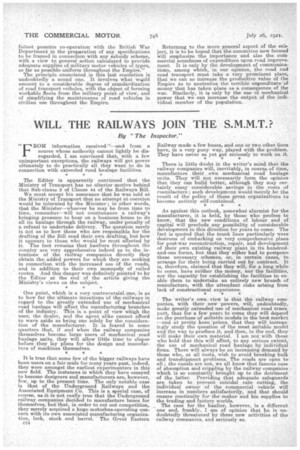WILL THE RAILWAYS JOIN THE S.M.M.T.?
Page 12

If you've noticed an error in this article please click here to report it so we can fix it.
By "The Inspector."
" ROM information received"—and from a source whose: authority cannot lightly be dis regarded, I am convinced that, with a few unimportant exceptions, the railways will get power ultimately to do practically all they want to do in connection with extended road haulage facilities.
The Editor is apparently convinced that the Ministry of Transport has no ulterior motive behind that Sub-clause 2 of Clause 44 of the Railways Bill.
We must accept his assurance that he was told at the Ministry of Transport that no attempt at coercion would be tolerated by the Minister; in other words, that the Minister—whoever he may be from time to time, remember—will not countenance a railway's bringing pressure to bear on a business house to do all its haulage through the railway, under penalty of a refusal to undertake delivery. The question surely is not as to how those who are responsible for the drafting of the Bill read their own drafting, but how it appears to those who would be most affected by it. The fact remains that hauliers throughout the country are very apprehensive indeed as to the intentions of the railway companies directly they obtain the added powers for which they are seeking in connection with the increased use of the roads, and in addition to their own monopoly of railed routes. And this danger was definitely pointed to by the Editor at the end of the article giving the Ministry's views on the subject.
One point, which is a very controversial, one, is as to how far the ultimate intentions of the railways in regard to the greatly extended use of mechanical road haulage will affect the manufacturing branches of the industry. This is a point of view whieh the user, the dealer, and the agent alike cannot afford to wave aside as being one solely for the consideration of the manufacturer. It is feared in some quarters that, if and when the railway companies themselves become large users of mechanical road haulage units, they will allow little time to elapse before they lay plans for the design and manufac ture of machines themselves. • It is true that some few of the bigger railways have been users, on a fair male for many years past, indeed, they were amongst the earliest experimenters in this new field. The instances in which they have essayed to become designers and manufacturers are, however, few, up to the present time. The only notable case is that Of the Underground Railways and the Associated Equipment Co. This is a special ease, of course, as it is not really true that the Underground railway companies decided to manufacture buses for themselves, but that, in order to cut out competition, they merely acquired a huge motorbus-operating concern with its own associated manufacturing organization, lock, -stock and barrel. ' The Great Eastern c14 Railway made a few buses, and one or two other lines have, in a very puny way, played with the problem. They have never as yet got seriously to work on it.
There is little doubt in the writer's mind that the railway companies will, inevitably, in course of time, manufacture their own mechanical road haulage units. They will not necessarily form the opinion that they can build better, although they may certainly essay considerable savings in the costs of manufacture; such development would merely be the result of the policy of these great organizations to become entirely self-contained.
As against this outlook, somewhat alarmist for the manufacturer, it is held, by those who profess to know, that the new conditions of labour and of capital will preclude any possibility, of considerable development in this direction for years to come. The fact is quoted that the trunk lines particularly were desirous of embarking on very comprehensive plans for post-war reconstruction, repair, and development of their own existing railway plant in its hundredand-one forms, but that they either had to postpone these necessary schemes, or, in certain cases, to arrange for their being carried out by contract, It is, therefore, claimed that they will, far a long while to come, have neither the money, nor the facilities, nor the capacity for establishing the facilities to enable them to undertake an entirely new branch of manufacture, with the attendant risks arising from lack of constructional experience.
The writer's own view is that the railway companies, with their new powers, will, undoubtedly, make greatly extended use of mechanical road transport, that for a few year,3 to come they will depend on, the purchase of suitable models in the best market —and at pretty keen 'prices, that they will increasingly study the question of the most suitable model and the way to produce it, and then, in the end, they will make their own material. I am, not with those who hold that this will affect, to any serious extent, the use of mechanical road haulage by individual firms. There will always be an increasing demand by those who, at all Costa wish to avoid breaking bulk and transhipment problems. The roads are open to all ; the canals are not, we all know that famous case of absorption and crippling by the railway coinpanies which is so constantly brought up to the detriment of the latter. Providing that adequate safeguards are taken to prevent suicidal rate cutting, the individual owner of the commercial vehicle will increase in numbers satisfactorily, and that should ensure continuity for the' maker and his supplies to the trading and factory worlds.
The case for the haulier, however, is a different one and, frankly, I am of opinion that he is undoubtedly threatened by these new activities of the railway companies, and seriously so.
































